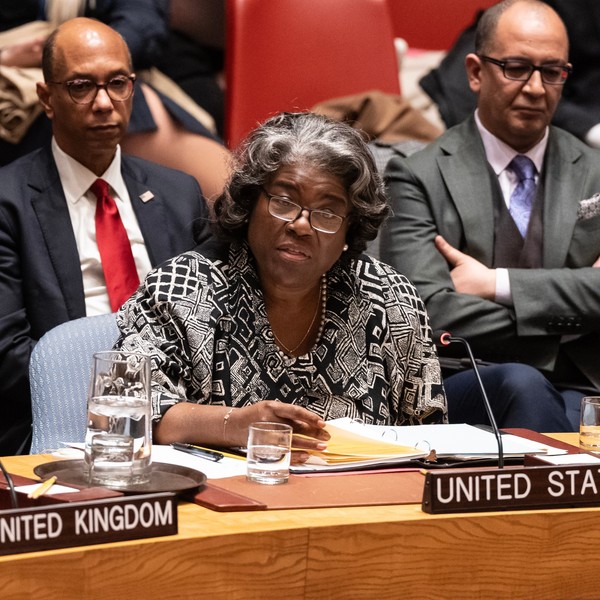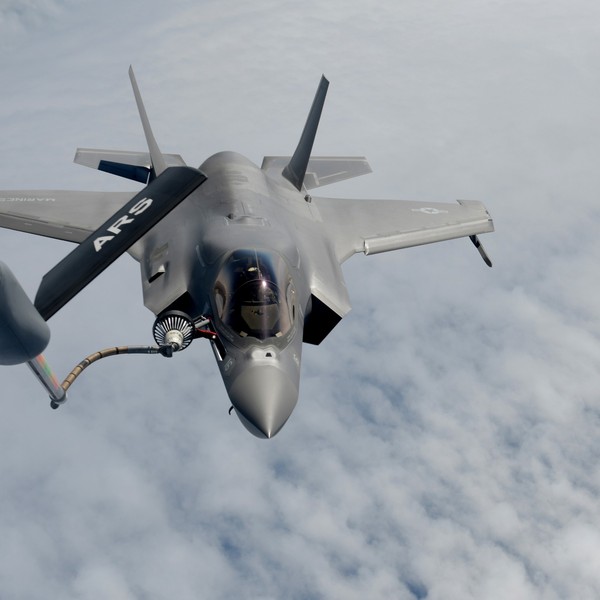Congresswoman Ilhan Omar calls President Trump’s policy towards Iran a “spectacular failure” which did not bring Iran to the negotiating table, and instead has resulted in an expansion of Iran’s nuclear program, empowered Iranian hardliners, and made future diplomacy more difficult.
In an exclusive interview with Responsible Statecraft, the Democratic lawmaker from Minnesota urged a reassessment of America's priorities in the Middle East and explained that the United States’ presence in the region has been “counterproductive.” She urged President-elect Biden to live up to American ideals and call out human rights violations, whether by close partners like Saudi Arabia and the United Arab Emirates, or by Iran and Syria.
Rep. Omar made history in November 2018 when she was elected as one of the first two Muslim women to the United States Congress, and the first Somali-American lawmaker. She soon became a rising star in the Democratic Party, sitting on the House Foreign Affairs Committee, and a lightning rod for Republicans and President Trump himself.
Rep. Omar has since been a vocal critic of the Trump administration’s foreign policy, especially towards the Middle East, pushing for fundamental shifts in the United States’ presence in the region. Here is our full interview:
NEGAR MORTAZAVI: Congresswoman Omar thank you for taking the time for this interview. Let's start with this election as the entire world has been watching the process very closely. How do you think Donald Trump's false allegations of fraud have affected America's image and the credibility of its democratic process around the world, especially when the U.S. government weighs in on election fraud in other countries?
REP. ILHAN OMAR (D-MINN.): It is deeply damaging, not just to our own democracy but to the cause of democracy around the world. Our elections should be the gold standard of elections around the world. When the President of the United States seeks to undermine the credibility of the electoral process, it undermines the trust and community that is the lifeblood of democracy.
Just as we’ve seen despots in places like Brazil and the Philippines copy Trump’s far-right faux populism, I worry that politicians will imitate his efforts to undermine democracy. The good news is that he is failing. We had record turnout this election, despite a pandemic. Election officials in his own party are finally standing up for our democracy and against Donald Trump. No matter what he says, Joe Biden is the incoming President of the United States.
NM: Now I want to ask you to assess U.S. foreign policy in the past four years. What is your take on America's standing in the world and the direction of its foreign policy towards friends and foes?
REP. OMAR: As I recently wrote, the past four years have been disastrous for the U.S. standing in the world and foreign policy as a whole. Donald Trump backed out of major diplomatic achievements like the Paris agreement and the Iran nuclear deal in favor of unilateralism and bluster. He torpedoed our alliances, alienating partnerships that were forged over decades. He propped up dictators around the world and tapped into a network of right-wing authoritarians from Saudi Arabia to Hungary to India. As a result, despots around the world feel more emboldened than ever. He put us on the brink of war — assassinating an Iranian official. Meanwhile, Pentagon budgets and our military presence around the world continued to grow.
NM: One of the cornerstones of the Trump administration has been its maximum pressure policy on Iran that is a combination of crippling sanctions and intense political and at times military pressure. What do you think about this policy as a strategy, as well as its impact on the people of Iran?
REP. OMAR: As a strategy, it has been a spectacular failure. It has done nothing to bring Iran to the negotiating table. In fact, Iran now has 12 times more uranium than the nuclear deal limited. It has only empowered the most hardline factions in Iran and increased animosity towards the United States, making it more difficult to strike another deal. As a moral matter, it is quite literally killing innocent people. The Iranian people — particular poor women and children — are suffering. During the pandemic, they have faced a staggering shortage of medicine and don’t have their basic needs met.
NM: The Biden administration will start its work in less than two months and his team has promised to re-engage with Iran. What do you think U.S. policy should be towards Iran? How should the United States engage Iran and Iranians?
REP. OMAR: We must do everything in our power to bring Iran back to the table and strike a deal. That would not only mean relief for the Iranian people, but also preventing a nuclear arms race in the Middle East that would threaten the United States and the whole world. I’m encouraged that President-elect Biden and Javad Zarif, the chief Iranian negotiator of the JCPOA, have shown a willingness to engage on this.
Moreover, we must assure the Iranian people that we stand in solidarity with their hopes, dreams and aspirations — that we want them to flourish and have basic human rights and self-determination, just as we do for people yearning for a better life around the world. And we very simply cannot support Iranian human rights by force, nor by “maximum pressure” against the government that violates those rights. We’ve tried that since 1979, and it has never worked.
NM: I also want to look at U.S. foreign policy towards the Middle East as a region and how years of wars and military presence has impacted the region, from the invasion of Iraq to the wars in Syria and Yemen. What is your vision for a U.S. foreign policy and military presence towards the region?
REP. OMAR: Our presence in the region has, to say the least, often been counterproductive. Many times, our ideals of human rights and justice have been ignored in favor of unilateralism, wars of aggression and material interests. For many people around the world, especially in the Middle East, the United States is seen as an outside occupying force that does not truly practice in the ideals we claim to stand for. I still believe in those ideals, and I believe President-elect Biden has an opportunity to live up to them. That means prioritizing human rights above short-term military alliances. It means calling out human rights violations wherever they are committed — whether it is by supposed allies like Saudi Arabia and the United Arab Emirates or by regimes like Iran or Syria. It will take decades to rebuild trust, but it’s very possible.
NM: The Trump administration has spent a lot of political capital on the Israel-Palestine issue and we have seen agreements between some Arab states in the Persian Gulf with Israel, but not with Palestinians themselves. What do you think of these agreements? And how do you think the United States can help the Israel-Palestine peace process effectively?
REP. OMAR: I wrote about this in my op-ed. I still believe, deeply, that peace is possible and that we must do everything in our power to bring about peace and self-determination for the Palestinian people, along with security for Israelis. I think it will require a sustained investment in dialogue between Israelis and Palestinians. It will also mean imposing consequences when Israel violates Palestinian human rights, including conditioning U.S. military aid.
NM: Let's talk about the Muslim Ban which Donald Trump imposed on his first days in office and Joe Biden has vowed to rescind on his first day as president. You yourself are a Muslim and you have been a refugee in this country, fleeing wars and violence. What do you think about the implications of this ban in the past four years? What message did it send to the world about America?
REP. OMAR: It is painful. It sends a message to people around the world that we are not valuable simply because of our country of origin or the religion we practice. My life was changed forever because I was able to come to the United States as a refugee and I will forever be grateful for that. But the ban, along with the drastic cuts in refugee resettlement, makes it harder for the little Ilhans around the world to flee war and oppression. It is a stain on American history — a direct violation of our most fundamental values. And I can’t wait for Joe Biden to place it in the dustbin of history where it belongs on day one of his presidency.
NM: And finally, I want to talk about yourself. Your story is a unique example of the American Dream. A young Muslim African girl who fled wars and settled in the US as a refugee became one of the first two Muslim women elected to Congress. Tell me about your journey looking back at your own life from where you are standing right now.
REP. OMAR: My story is a uniquely American story. I came to this country as a refugee, when the only two English words I knew were “hello” and “shut up.” I worked multiple jobs to pay my way through college while raising young kids, and eventually was able to represent my community in the United States House of Representatives. As a first, I know there a people around the country whose hopes and dreams I embody. But I also know that it is not enough to simply get to Congress. I owe it to my district and the people whose aspirations I represent to leave the world a better place than I found it. I owe it to them to fight for an America where everyone has the opportunity to achieve their full potential and will be treated equally under the law. That’s why I continue to serve.















